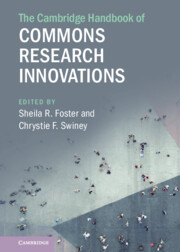Book contents
- The Cambridge Handbook of Commons Research Innovations
- The Cambridge Handbook of Commons Research Innovations
- Copyright page
- Contents
- Figures
- Tables
- Contributors
- Introduction
- Part I Revisiting the Origins and Evolution of Commons Thought
- Part II Averting New Tragedies
- Part III New Forms of Contested Commons
- Part IV Urban Landscape and Infrastructure as a Commons
- Part V Reassessing Old and New Institutions for Collective Action
- Part VI Managing and Restoring the Commons
- Part VII Law, Legal Theory, and the Commons
- Part VIII Technology, the Internet, and the Future of Commons Governance
- Index
Introduction
Commons Research in the Twenty-Frist Century and Beyond
Published online by Cambridge University Press: 29 October 2021
- The Cambridge Handbook of Commons Research Innovations
- The Cambridge Handbook of Commons Research Innovations
- Copyright page
- Contents
- Figures
- Tables
- Contributors
- Introduction
- Part I Revisiting the Origins and Evolution of Commons Thought
- Part II Averting New Tragedies
- Part III New Forms of Contested Commons
- Part IV Urban Landscape and Infrastructure as a Commons
- Part V Reassessing Old and New Institutions for Collective Action
- Part VI Managing and Restoring the Commons
- Part VII Law, Legal Theory, and the Commons
- Part VIII Technology, the Internet, and the Future of Commons Governance
- Index
Summary
This book grew out of a conference organized in 2018 to mark the fiftieth anniversary of Garrett Hardin’s The Tragedy of the Commons, one of the the most cited articles of the twentieth century. The conference was less a celebration of the substance of Hardin’s essay than an acknowledgment of how it has shaped half a decade of research and theory. The conference, held at Georgetown University’s Law Center in Washington, DC, brought together nearly fifty researchers from over twenty different nations to present their research on a wide variety of interdisciplinary and transdisciplinary perspectives on the “commons.” The scope and depth of research presented at this conference could hardly have been imagined by Garrett Hardin when he published his essay in 1968. Nor could he have imagined that the first woman to win the Nobel Prize in Economic Science, Elinor Ostrom, would debunk the central assumption underlying his famous essay – that shared resources must be either privatized or heavily regulated in order to prevent their depletion. In many ways, however, Ostrom revived what might have been a waning theory and field by setting in motion a whole new line of inquiry and research empirically demonstrating the variety of ways that resource users and communities come together to cooperatively utilize and sustainably manage shared resources.
- Type
- Chapter
- Information
- Publisher: Cambridge University PressPrint publication year: 2021

